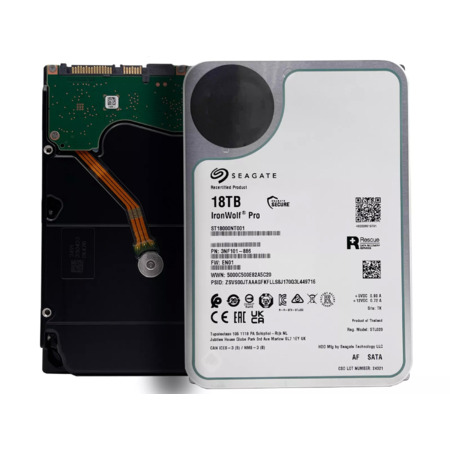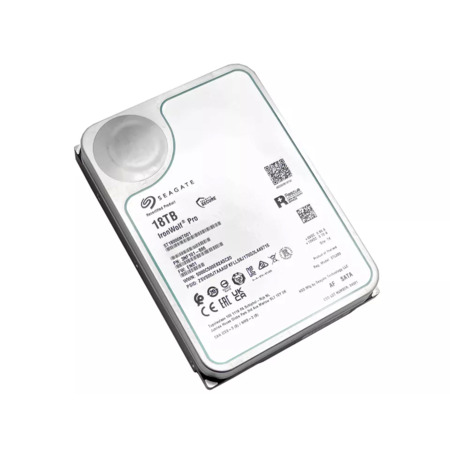expiredSIR_of_Cricket posted Sep 01, 2024 09:54 PM
Item 1 of 2
Item 1 of 2
expiredSIR_of_Cricket posted Sep 01, 2024 09:54 PM
Refurb: 18TB Seagate Ironwolf Pro 7200RPM 3.5" SATA NAS Hard Drive
+ Free Shipping$156
eBay
Visit eBayGood Deal
Bad Deal
Save
Share






Leave a Comment
Top Comments
Is this deal/drive/seller legit?
tl;dr: Yes.
The two big names for "refurb" drives are ServerPartsDeals (sometimes called SPD) and goHardDrive (GHD). SPD generally offers 2 year warranties; goHardDrive nowadays generally offers 5. I'm sure you can find horror stories somewhere for either, but in my experience/observation, they're both pretty true to their word and as well regarded as they come.
There are technically two warranties active if you buy this: the one-year warranty from eBay (via Allstate) and the five-year from GHD. If something goes wrong, trust me, you want to try to work it out with GHD first, but hey, peace of mind.
If it's DOA (most likely failure scenario), it's covered by buyer protection with free return shipping, no RMAs required.
The "0 hours" is nonsense, but the reality is that all refurb companies do it. They zero out the SMART info when they're "refurbing." Sometimes it'll be authentic overstock and actually have zero drive hours, but most of the time it's just zeroed. You might find this sketchy, but the reality is that everyone does it.
Seagate calls these drives recertified, which is much more honest. Generally, the manufacturer runs some SMART or proprietary tests and zeroes the SMART. I think SPD tends to re-run their own SMART tests before shipping, thereby putting some power-on hours on the drive.
What makes a good deal on a disk?
tl;dr: Being cheap and from a real brand, and this is both.
$8.67/TB is a very good price for a high-capacity hard drive of any kind, even sketchy ones (see diskprices.com). If your account is eligible for the $10 off, it's an actively great deal. If you're willing to go down to 10-14TB/drive you can save some per HDD, but you need the bay count. For a lot of people, the extra $1-2/TB from rock bottom prices to save drive bays is worth it.
Is this a good drive?
tl;dr: For NAS/SMB use, yeah, it's solid in specs, particularly if you need something quieter
Some people swear that Seagate is pure evil and all drives from them fail immediately. Some people say that Western Digital (WDC) is evil because they have done some bad business practices and that their drives have gone downhill in the last decade. Some people say that WDC is evil but HGST, now owned by WDC (e.g. the Ultrastar series) are good. The inconvenient truth is that it can vary by model, year, and capacity, and that it is easy to lie with statistics to fit a narrative.
According to storage provider Backblaze, failure rates are more correlated with drive capacity than manufacturer. Unfortunately, there is not enough data in the 18TB+ space to come to any conclusions.
Anecdotally, IronWolf Pro drives are decently well regarded. For homelabby, NAS, datahoarder things, WDC Red Pros, IronWolf Pros, EXOS, and Ultrastar are the ones people talk the most about. IMO, IronWolf Pro's killer feature is that they're a lot less noisy than other drives of their class (link, if you read German or can use Google Translate; this is the 20TB version from the same model year). This doesn't matter if you have a closet or basement to put your NAS, but might if you don't.
The NT drives have 2.5 million hour MTBF, which doesn't mean what you think it means but is considered very good.
EXOS and Ultrastar are enterprise drives, meaning they generally have much higher specs for read/write endurance, but they're also loud as hell.
Will refurb drives cause me to lose all my data?
tl;dr: Not unless your setup is really bad anyway, but if you will lose sleep worrying about drive failures, don't do it anyway.
Listen, if you're entertaining thoughts of an 18TB IronWolf Pro, you probably know enough about storage to not be running a sixteen disk striped array with no backups. If you do that, yeah, maybe, but that can also happen with new drives.
Some often-given advice is to use something like RAIDZ2 if you're feeling extra paranoid and/or don't have a convenient way to get backups, or RAIDZ1 if you feel comfortable enough with your backups.
(RAID isn't a backup, but it's a fantastic way to avoid headaches and avoid going back to backups.)
You will sometimes hear people say that Refurb drives of a certain age are just as, if not more reliable (in MTBF) than new ones. This is because, according to Backblaze, drive failure rates tend to be highest when they are very new (<1yr) or very old (>5yr). This so-called "infant mortality" has decreased -- a lot -- over the last decade, but it's obviously true that a drive with a few years of wear on it has shown that it can survive a few years of wear.
Unfortunately, since refurb companies zero the SMART data (to prevent people from pick-and-choosing low-actual-life drives), you have no way to tell if your drive has 1 or 40,000 hours on it. These drives were launched in 2020, so... it's between those two numbers, but there's no way to tell where. Probably on the higher end, since these drives tend to be enterprise server pulls.
Don't let a good deal pressure you into buying something you don't want.
This is more just life advice, but some people need to hear it. If you're not comfortable with the concept, it's not worth saving the money. You're probably trying to buy a thing to make yourself happier. If it doesn't make you happier, don't do it.
Hope this helps someone.
A brand new drive has a higher failure rate than one that got a second look over by the manufacturer.
It's clear by the fact that your only other base of comparison is WD that you either lack experience with enterprise drives or you're just regurgitating forum posts from 2012.
Seagate's enterprise line doesn't have a "reputation".
Stay in your lane.
73 Comments
Sign up for a Slickdeals account to remove this ad.
Edit: https://pages.ebay.com/coupon/2024/fopppv3/
Says to use with PP or Venmo at checkout
https://pages.ebay.com/coupon/2024/fopppv3/
Sign up for a Slickdeals account to remove this ad.
https://pages.ebay.com/coupon/2024/fopppv3/
Sign up for a Slickdeals account to remove this ad.
Leave a Comment